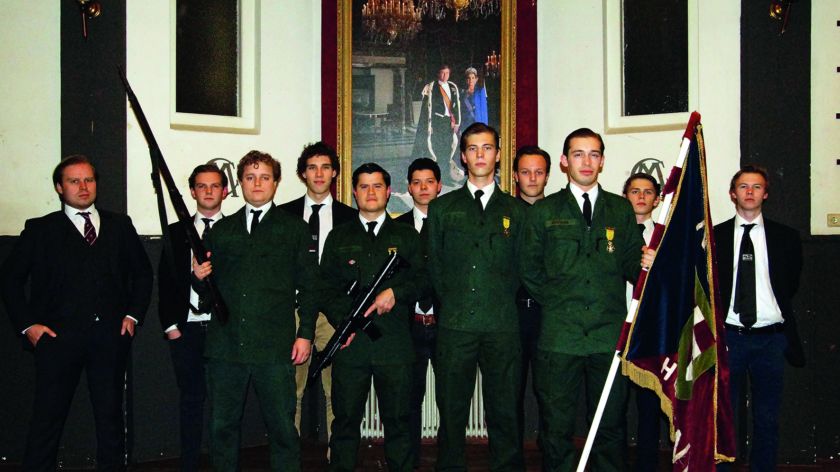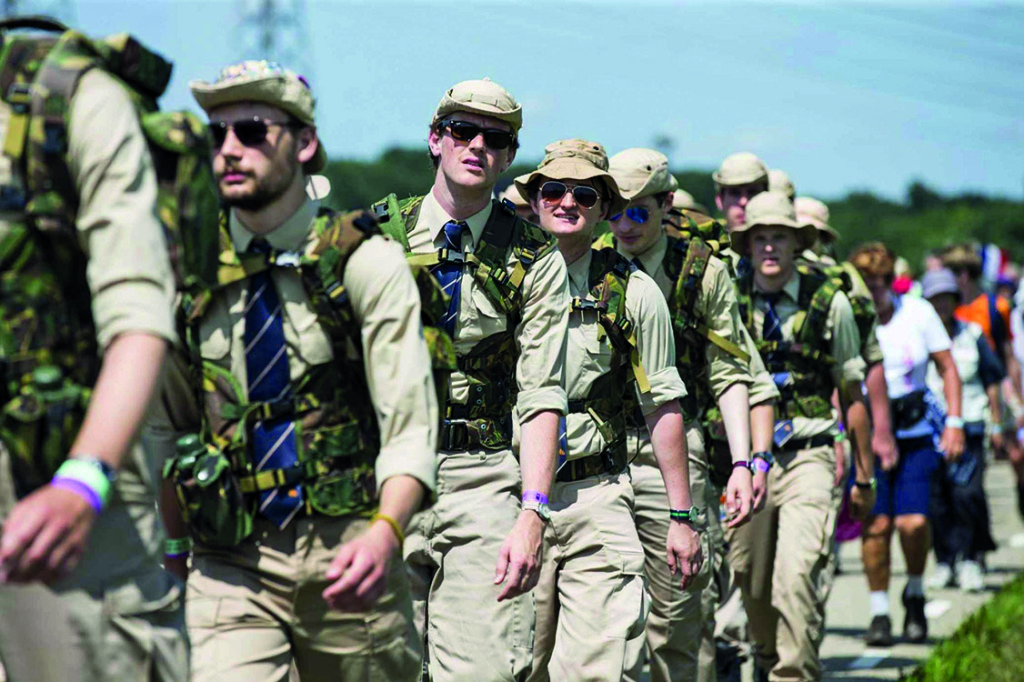The ‘student army’ of Nijmegen
A lot of boys want to be soldiers when they grow up. Some members of the Carolus Magnus student association, also known as Carolingers, come pretty close: they joined Het Vendel student militia and participate in processions and ceremonial parades alongside the Dutch armed forces. But they only fire a weapon during exercises and competitions.
The Hague, September 2014: student and Carolinger Nanne Kusters stands at attention at the Binnenhof complex. He stays in the same position for seven hours, one in an endless row of soldiers, until the Golden Coach passes by.
‘I just love to shoot’
‘It was extremely intense,’ he says. ‘Seven hours is a long time.’ Now, in March 2017, Kusters joins two comrades in the common area of the Sterrenbos complex. Together, they reminisce about the past. What did they experience with the small and unknown militia of which they are members? Most of them refuse to talk to journalists about Het Vendel, the Carolus Magnus shooting club. Today they are and they’re doing it in full uniform, complete with black army boots and a bottle of Dutch gin on the table. The gin is a tradition, of which there are many in Het Vendel.
‘Would you like a glass?’ asks President Milán Payan Witteveen.
Student militias date back to 1665, when they were used as reinforcements in the defence cities. Het Vendel in Nijmegen was founded in 1931 and currently serves as an association that gives students with an interest in the military a glimpse into the world of defence. They participate in shooting competitions, workshops and simulations, and attend ceremonial parades and processions.
Dancing
One annual tradition is to participate in the Nijmegen Four Days Marches. Waved off by tipsy fellow Carolingers, they leave at dawn, singing as they start their forty kilometre march. That week, they spend the night at Heumensoord camp, located behind Radboud University, with more than five thousand soldiers from around the world. ‘When we first enter the camp, we always do a little dance,’ explains Payan Witteveen. ‘Each unit does something unique. The Germans, for example, immediately down half a litre of beer.’ The members of Het Vendel sing a traditional Carolus Magnus song on arrival. They start in military style, with the group divided into two rows, and march to the beat of the song. They then link their arms and start dancing. ‘You’re exhausted from the long walk, but you get a second wind as soon as you enter the camp,’ says the President. ‘The atmosphere is fantastic; it’s an absolute riot.’
‘The Americans refer to us as the lads with the ties’
According to Payan Witteveen, they want to be the life of the party. They fulfil this role en route by singing exuberantly, by taking each roundabout they come across twice and by picking a female bystander out of the crowd every now and then, slinging her over their shoulders and carrying her for half a kilometre. ‘The Americans jokingly refer to us as ’the lads with the ties’. But they end up respecting us after the first day: we can drink all night and then get up and walk without complaint the next morning.’
Secretary Roderick Enzerink looks a bit glum as the other two swap stories about the Four Days Marches. ‘I’d trained harder than anyone,’ he says, sipping his second glass of gin. ‘But I had to quit.’ When asked why, he says: ‘My shoes were too small…’
Second World War
The men didn’t become members of Het Vendel simply to join the Four Days Marches. ‘I just love to shoot,’ says Payan Witteveen, a glint of happiness in his eyes. A lot of boys want to be soldiers when they grow up and a student militia like this is the perfect opportunity to fulfil that dream – at least to some extent. ‘It’s so great to fire a gun.’ He proudly grabs his phone and shows us some photos. In one photo he’s putting together weapons that consists of dozens of large and small parts; in another he’s firing in different positions.
Shooting commissioner Nanne Kusters refers to the student militia as ‘exciting’, but takes a pacifist approach to shooting. ‘It’s fascinating, almost meditative. You have to pay close attention to your stance and your breathing. Getting it right is a sport of its own.’ His interest in Het Vendel stems from his interest in international affairs, a field in which he is currently pursuing a Master’s degree. As a pacifist, he doesn’t have to worry about being called to the front lines. Should the Netherlands ever go to war, the members of Het Vendel are expected to act as resistance fighters – the same role they played during the Second World War. At that time, students were active in the resistance. Some Carolingers are still remembered as heroes for their contributions to the underground movement.
History
Student militias date back to 1665. During the Second Anglo-Dutch War, the city of Groningen was under threat of besiegement. Students offered to help defend the city and a separate company was set up for them. This was repeated many times over the years, resulting in flourishing student militias under King Willem II. During the Cold War, Prince Bernhard took the militias under his patronage. These militias have been competing for the annual Prince Bernhard trophy since 1998. The Netherlands currently has ten student militias: in Utrecht, Leiden, Amsterdam, Delft, Wageningen, Rotterdam, Groningen, The Hague, Enschede and Nijmegen.
Secretary Enzerink was urged by his fellow fraternity brothers to apply for membership to Het Vendel. ‘Being a member of Het Vendel is a tradition in my fraternity,’ he says. He’s happy with the experiences and the defence knowledge he’s gained so far.
According to the trio, one of the annual highlights is the army reception at De Zwaluwenberg estate in Hilversum, where Prince Bernhard spent thirty years serving as Inspector-General of the Dutch Armed Forces. As patron of the student militia, he even had a trophy was named after him, which the associations compete for annually.
The association is scheduled to attend a training day for the mobile police unit (ME) next month. ‘On a day like that we’re assigned specific roles,’ explains Kusters. ‘Like pretending to be an angry mob, for example.’ Payan Witteveen grins; he’s come home black and blue from these excursions before. ‘The more you challenge the MEs by shouting or refusing to cooperate, the rougher they get,’ he says.
Het Vendel currently has some thirty members. The management board, known as the directorium or ‘directorate’, has no plans to expand the association’s membership. What the gentlemen want instead is to adjust their policy to allow female members to apply, which isn’t possible at the moment. ‘It has nothing to do with misogyny, but with our traditions and our statute,’ explains Payan Witteveen. The men agree that their policy is a little outdated and are therefore looking for ways to introduce changes while respecting their traditions. ‘We recently invited women to participate in a shooting exercise,’ says Kusters. ‘The Defence Department is keeping up with the times and so should we.’
When asked how one applies for membership to Het Vendel, Payan Witteveen gives us a mysterious smile. ‘We can’t tell you that. It’s a secret.’ What he can tell us is that membership to Carolus Magnus is a prerequisite.
Apolitical organization
Payan Witteveen and Enzerink are recent graduates, which means their membership to Het Vendel officially expires at the end of this year and real life begins. Membership can be a stepping stone to a job at the Department of Defence; in fact, it’s one of the reasons why the military wants to involve students in its organisation. Highly educated students are extremely welcome. The President isn’t ruling out a job like this and is proud to add his membership to his CV. Enzerink, however, has his doubts. He studied environmental and social sciences and is worried the term ‘student militia’ will raise concerns among potential employers, either because they don’t know what it means or because the term itself has specific connotations. The media has been known to accuse student militias of being right-wing nationalists. ‘This isn’t true at all,’ he says, and Kuster agrees. ‘The members of our association come from the entire political spectrum. Politics really doesn’t matter to us; we’re an apolitical organization.’
The three have very different plans for their remaining time at Het Vendel. Payan Witteveen sits up straight, grins, and says he’s looking forward to the upcoming shooting events. Enzerink blushes slightly and says his goal is to finish the Four Days Marches this year. Kusters wants to build bridges to other parts of the Dutch defence organization and see how the Department of Defence and Het Vendel can help one another. These three goals are illustrative of the three individuals who sit across from us. They are three very different men connected by one thing: a common interest in defence.





